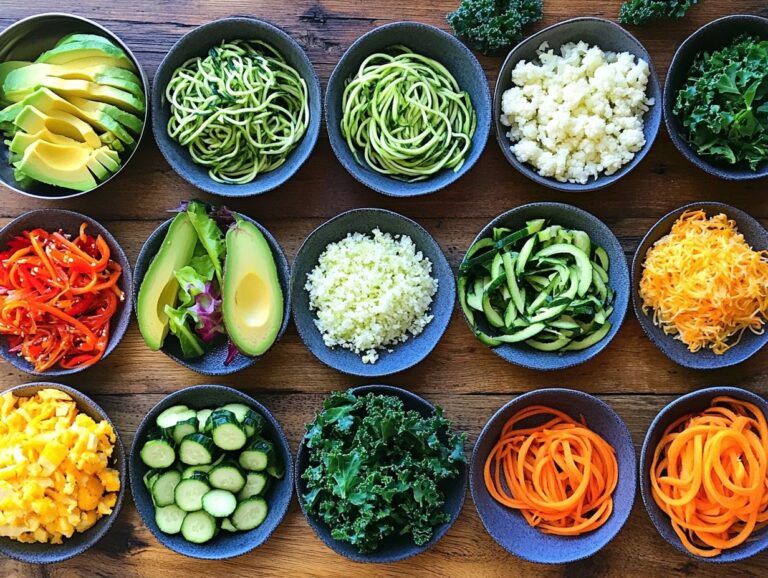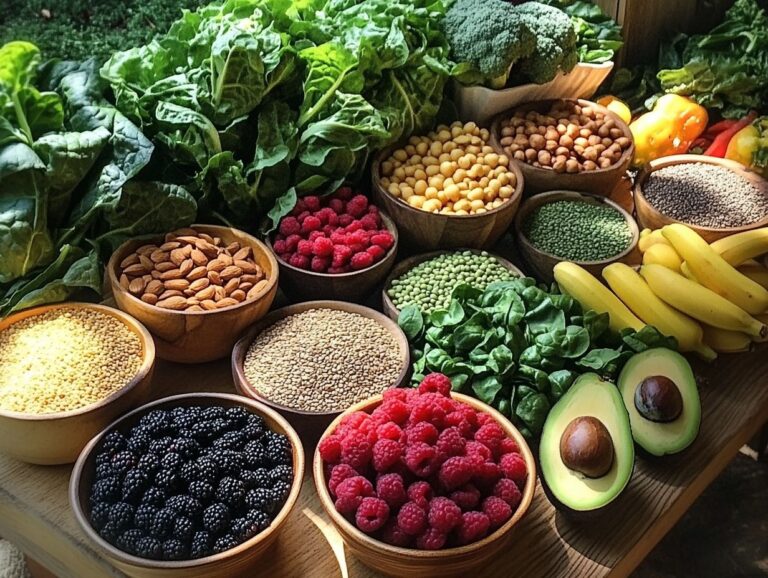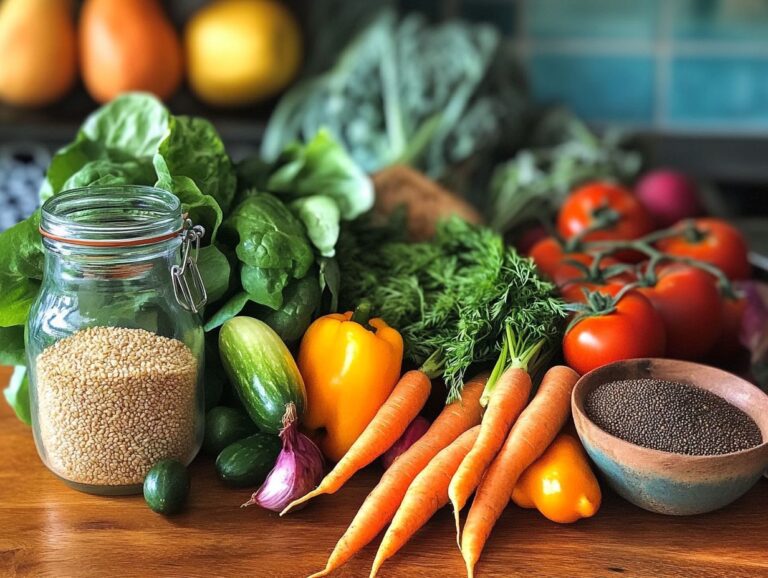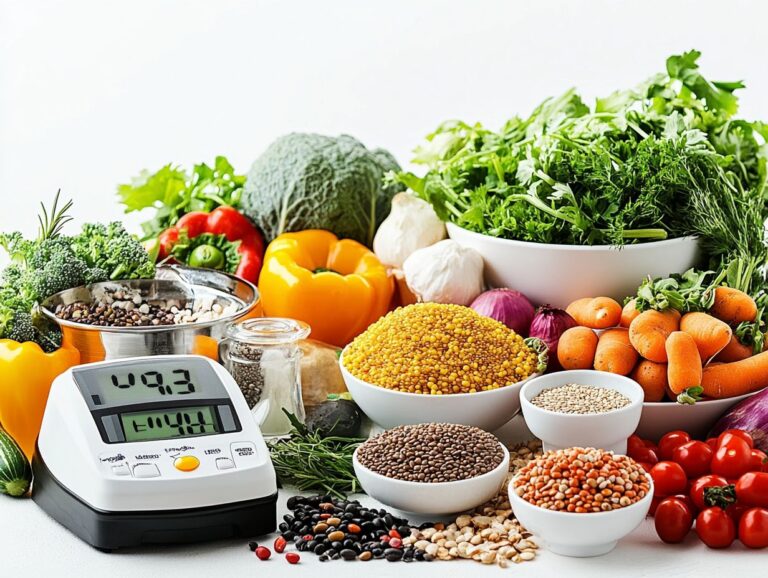Curious about the rising trend of veganism? This article explores the essentials of a vegan diet, a nutrient-rich diet that promotes health benefits, from its definition and benefits to practical tips for making the switch. Discover how going plant-based can aid in weight loss, improve overall nutrient intake, and reduce the risk of chronic diseases, such as heart disease and diabetes. Learn what to expect when transitioning to a vegan lifestyle, including changes in taste buds, dietary habits, and the benefits of incorporating whole grains and legumes. Get ready to uncover delicious vegan options and ensure you re meeting your nutritional needs with a focus on plant foods!
What is a Vegan Diet?
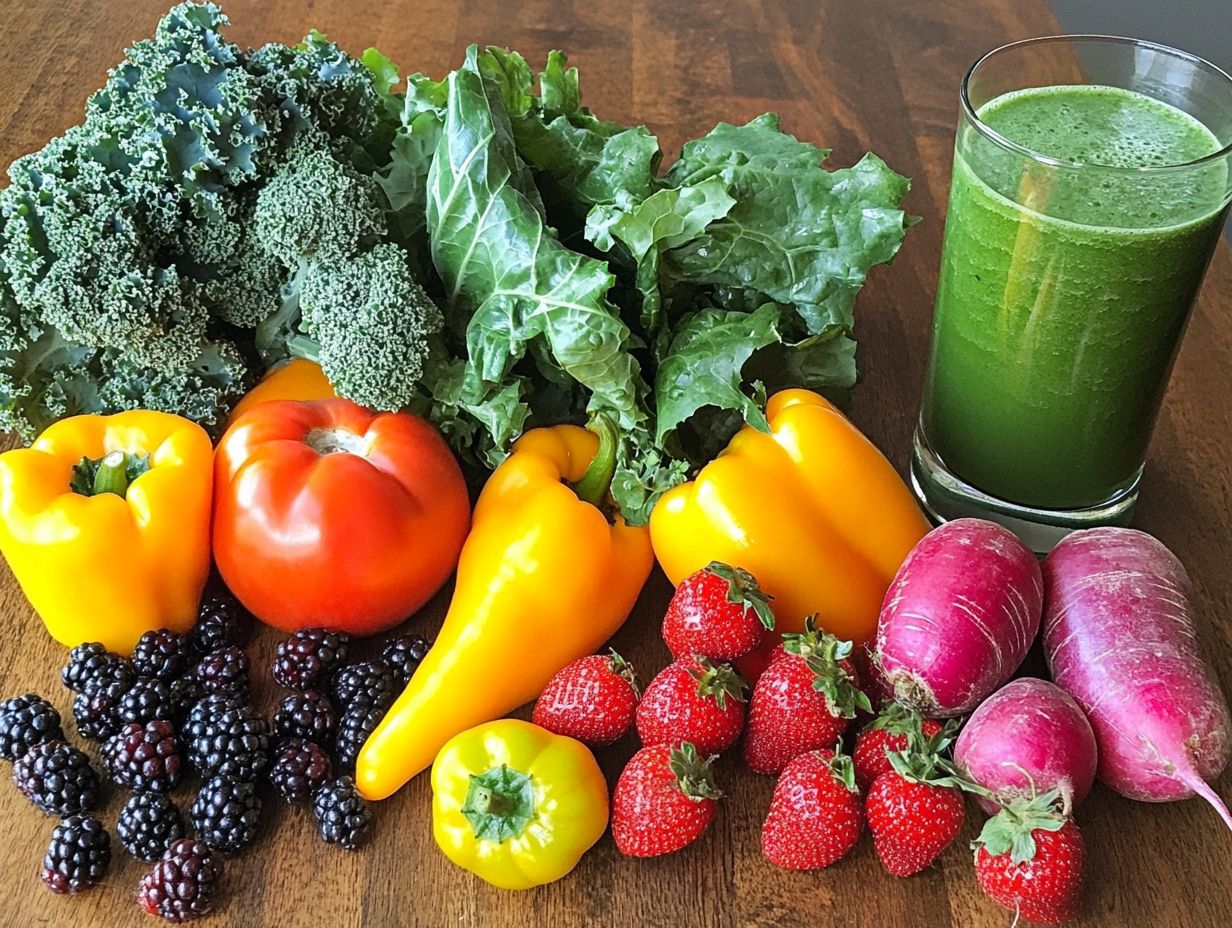 A vegan diet is a lifestyle choice that excludes all animal products and emphasizes a wide variety of plant foods, including fruits, vegetables, whole grains, legumes, nuts, and seeds, which are considered nutritional powerhouses. Many individuals choose a vegan diet for reasons related to personal health, animal welfare, and environmental sustainability. This dietary approach allows people to explore a diverse array of whole food options that are nutrient-dense. If properly planned, a vegan diet can meet all dietary requirements without relying on processed or unhealthy ingredients.
A vegan diet is a lifestyle choice that excludes all animal products and emphasizes a wide variety of plant foods, including fruits, vegetables, whole grains, legumes, nuts, and seeds, which are considered nutritional powerhouses. Many individuals choose a vegan diet for reasons related to personal health, animal welfare, and environmental sustainability. This dietary approach allows people to explore a diverse array of whole food options that are nutrient-dense. If properly planned, a vegan diet can meet all dietary requirements without relying on processed or unhealthy ingredients.
What are the Benefits of a Vegan Diet?
The advantages of veganism extend beyond personal choice, encompassing significant health benefits that have been documented in numerous studies. Individuals who adhere to this diet often report healthier cholesterol levels, improved blood pressure, and better weight management, along with a reduced risk of chronic diseases such as heart disease and diabetes. Furthermore, a plant-based diet rich in nutrient-dense foods has been linked to enhanced metabolic health and overall well-being.
1. Weight Loss
Weight loss is one of the most commonly observed benefits of a vegan diet, primarily due to the higher consumption of fiber and the lower calorie density compared to diets that include animal products. By focusing on whole grains, fruits, and vegetables, individuals can achieve the necessary calorie deficit for weight loss without feeling deprived or hungry, which supports the establishment of healthy habits. This approach not only helps individuals feel full but also encourages them to choose nutrient-dense ingredients. Fiber-rich foods, such as legumes, green leafy vegetables, and whole grains, enhance digestive function and regularity while promoting prolonged feelings of satiety. As people reduce their intake of calorie-dense options like processed foods and sugary snacks, they naturally begin to opt for more nutritious choices. This shift not only aids in weight loss but also enhances overall quality of life, as a plant-based diet is associated with a decreased risk of chronic diseases and the promotion of healthier lifestyle behaviors.
2. Improved Nutrient Intake
An improved nutrient intake is a defining feature of the vegan diet, which encourages a diverse range of plant foods rich in essential vitamins, minerals, and antioxidants. By prioritizing whole foods such as fresh produce, whole grains, and legumes, individuals can undergo significant dietary changes that enhance overall nutritional quality and support long-term health. This transition often leads to an increased consumption of nutrient-dense components, such as fiber, which aids digestion and promotes satiety, as well as vitamins A, C, and E, which are crucial for immune function and skin health. Plant-based diets are typically abundant in potassium and magnesium, both of which are vital for maintaining heart health and regulating blood pressure. Additionally, incorporating nuts and seeds can enhance the intake of healthy fats and minerals like iron and zinc, which are often less bioavailable in animal-derived foods. Therefore, by embracing this dietary approach, individuals can effectively optimize their nutrient profile, contributing to vibrant health and well-being.
3. Lower Risk of Chronic Diseases
A vegan diet can significantly lower the risk of chronic diseases, including heart disease and diabetes, thereby positively influencing overall health outcomes. A higher intake of plant-based foods, combined with a lower consumption of pro-inflammatory items, supports healthier cholesterol levels and improved blood circulation, which in turn fosters a more active lifestyle. Research indicates that individuals who adopt a plant-based lifestyle tend to have lower body mass indexes (BMIs) and enhanced insulin sensitivity, both of which are key factors in reducing the risk of Type 2 diabetes. Furthermore, the high antioxidant content in fruits and vegetables helps counteract oxidative stress, a contributing factor in many chronic diseases. Experts recommend incorporating whole grains, legumes, and nuts into a vegan diet to enhance nutrition, aligning with the principles of lifestyle medicine that emphasize the importance of dietary interventions in preventing chronic illnesses. These positive changes are essential steps toward achieving a sustainable lifestyle.
What to Expect When Switching to a Plant-Based Diet?
When switching to a plant-based diet, individuals can expect to experience both physical and mental changes as their taste buds adapt to the new flavors and textures of plant foods, contributing to health improvements such as better blood circulation and lower cholesterol levels. This dietary transition often involves significant changes that can lead to an increase in fiber intake. In some cases, individuals may also experience detox symptoms as their bodies adjust to the absence of processed and animal foods.
1. Changes in Taste Buds
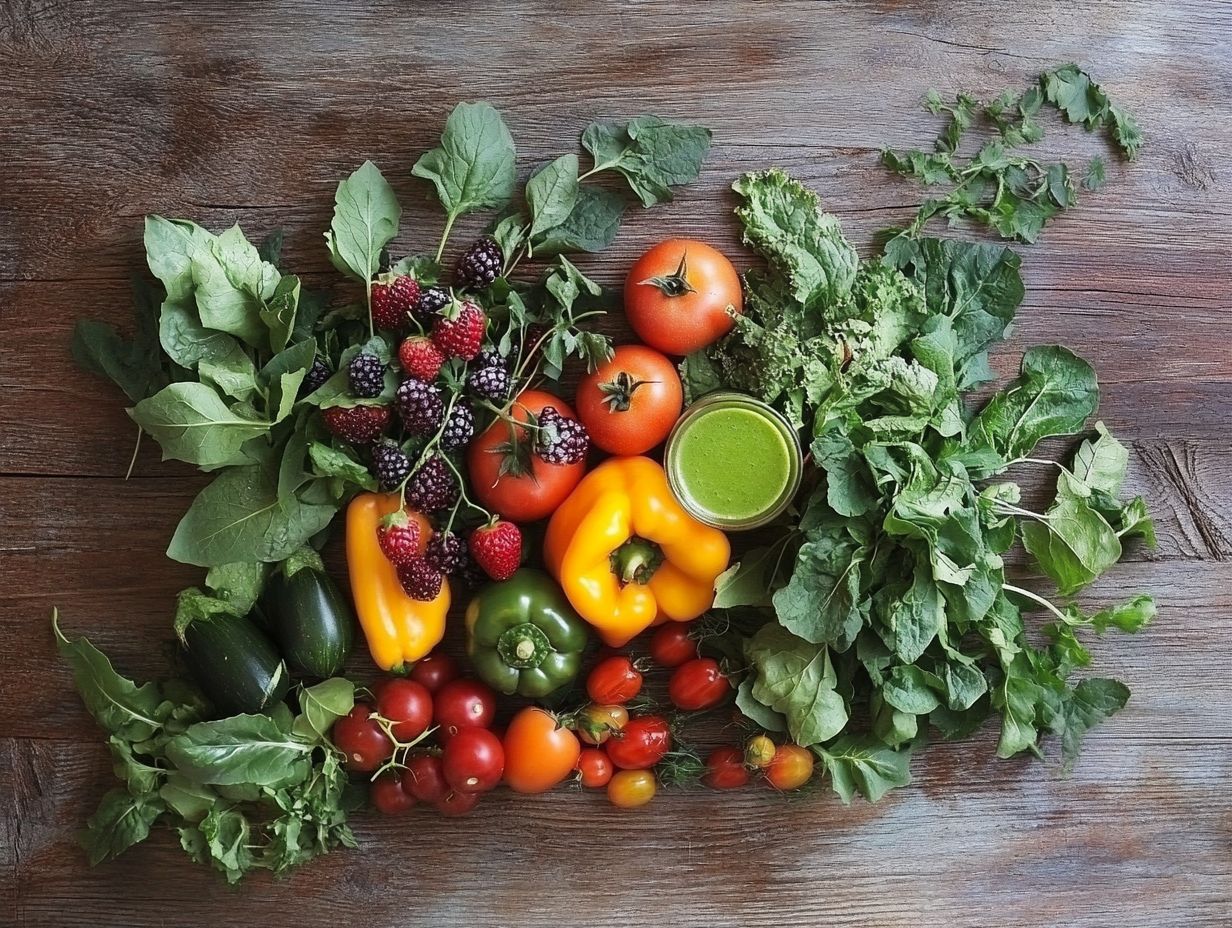 When individuals switch to a plant-based diet, their taste buds begin to change as they explore flavors that are less commonly found in animal products. This exploration can lead to new dietary changes and cravings for healthier foods. As they embark on this journey toward a healthier and more colorful diet, their palate undergoes a significant transformation, becoming more sensitive to flavors and tastes that were previously masked. Initially, it is common to experience strong cravings for comfort foods, which are often rich in fat or sugar. However, over time and with experimentation, individuals may find joy in consuming fresh fruits, vegetables, grains, and legumes, discovering that their taste buds are adaptable to a wide range of flavors and textures. The incorporation of herbs, spices, and innovative cooking techniques can facilitate this transition and help manage cravings effectively.
When individuals switch to a plant-based diet, their taste buds begin to change as they explore flavors that are less commonly found in animal products. This exploration can lead to new dietary changes and cravings for healthier foods. As they embark on this journey toward a healthier and more colorful diet, their palate undergoes a significant transformation, becoming more sensitive to flavors and tastes that were previously masked. Initially, it is common to experience strong cravings for comfort foods, which are often rich in fat or sugar. However, over time and with experimentation, individuals may find joy in consuming fresh fruits, vegetables, grains, and legumes, discovering that their taste buds are adaptable to a wide range of flavors and textures. The incorporation of herbs, spices, and innovative cooking techniques can facilitate this transition and help manage cravings effectively.
2. Increased Fiber Intake
The most significant benefit of a plant-based diet is the increase in fiber intake. High-fiber foods, such as fruits, vegetables, and whole grains, are essential for good digestive health and overall well-being, supporting a nutrient-rich diet. By focusing on these nutrient-rich foods, individuals can significantly boost their daily fiber intake, which has been shown to support the growth of healthy gut flora, promote regular bowel movements, and prevent constipation. Additionally, a fiber-rich diet aids in weight control by providing a sense of fullness, reducing the likelihood of overeating, and stabilizing blood sugar levels. Therefore, incorporating plant-based foods into daily meals is an effective strategy for achieving both digestive health and maintaining a healthy weight, fostering sustainable practices for long-term well-being.
3. Possible Detox Symptoms
Yes, it is common to experience detox symptoms in the early stages of transitioning to a plant-based diet, particularly if this shift involves a significant reduction in processed foods and a focus on improving gut health. Symptoms such as fatigue, headaches, and digestive discomfort may arise as the body adjusts to a healthier, nutrient-dense diet. These reactions can be attributed to the body flushing out toxins that have accumulated over time from a less nutritious dietary regimen. This adjustment period may also trigger cravings for familiar comfort foods that are high in sugar and fats, potentially intensifying the detox process. To alleviate these symptoms, it is essential to:
- Drink plenty of water,
- Gradually introduce fiber-rich foods,
- Create balanced meals that include a variety of fruits, vegetables, legumes, and whole grains.
Engaging in regular exercise and mindfulness practices can further support the transition, helping to optimize energy levels and overall well-being.
How Does a Vegan Diet Help with Weight Loss?
A vegan diet promotes weight loss primarily due to its lower calorie content and high fiber content. By eliminating processed foods and opting for whole food alternatives, individuals can create meals that are more filling, which supports their weight loss goals.
1. Lower Calorie Intake
Calorie reduction plays a significant role in the weight loss potential of a vegan diet, as it encourages the consumption of lower-calorie, nutrient-rich foods compared to traditional animal product-based diets. This shift is particularly beneficial for individuals seeking to lose weight while still obtaining essential vitamins and minerals. Meal planning for a vegan diet aimed at weight loss may involve selecting low-calorie, high-nutrient foods such as fruits, vegetables, whole grains, legumes, and nuts, which are rich in fiber and protein but lower in calories. A weekly menu could feature healthy options like:
- Quinoa salad
- Lentil soup
- Vegetable stir-fry dishes
Preparing meals at home allows for better control over ingredients and portion sizes, promoting mindful eating and helping maintain a calorie intake conducive to weight loss.
2. Higher Fiber Intake
Fiber plays a crucial role in weight loss on a vegan diet by promoting feelings of fullness and regulating blood sugar levels. This makes it easier to resist temptations and maintain a healthy lifestyle. Fiber-rich foods, which include a variety of vegetables, fruits, legumes, and whole grains, are essential for keeping individuals feeling satisfied for extended periods. Incorporating fiber into meals can help reduce hunger cravings, which often lead to unhealthy snacking, overeating, or choosing junk food. Additionally, fiber facilitates the slow absorption of nutrients, ensuring a steady source of energy while preventing spikes and drops in blood sugar that can trigger cravings. This helps in maintaining insulin resistance and balanced blood circulation. As a result, daily meals that include fiber-rich foods can aid in weight loss and encourage individuals to make healthier dietary choices that align with their weight loss goals and overall health improvements.
3. Reduced Intake of Processed Foods
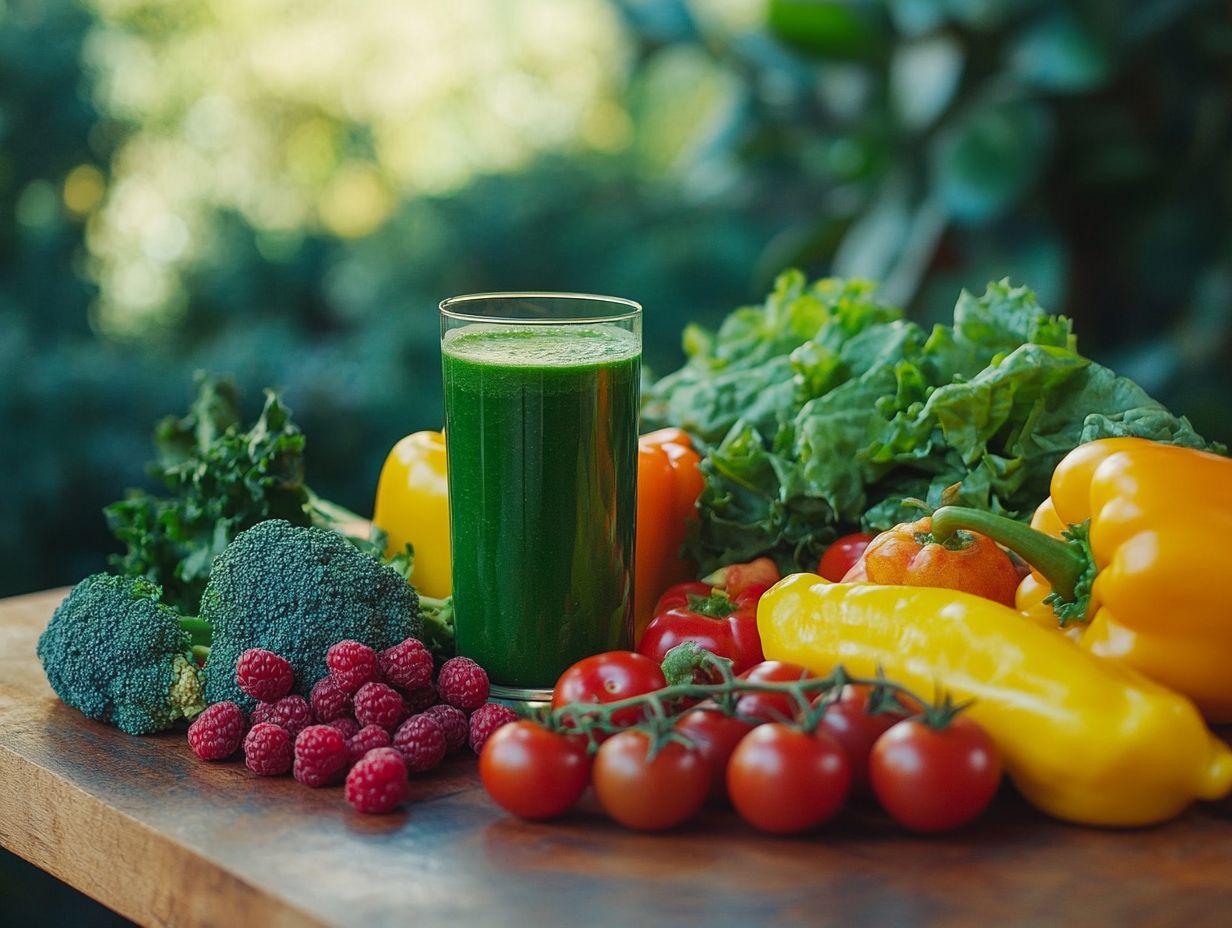 One positive aspect of a vegan diet is its lower consumption of processed foods, which often contain unhealthy ingredients, added sugars, and unhealthy fats that can hinder weight loss and lead to negative health outcomes. By reducing the intake of these processed options, it becomes easier to focus on whole, nutrient-dense foods such as fruits, vegetables, legumes, and whole grains, all of which are naturally low in calories and high in fiber. These dietary changes support not only weight management but also improved metabolic health. This shift not only aids in weight management but also promotes better overall health, reducing the risk of chronic diseases such as heart disease and diabetes while supporting other health improvements like clear skin and stable cholesterol levels. The added sugars and unhealthy fats found in processed foods can trigger cravings and lead to overeating, making it more difficult to achieve and maintain a healthy weight, thus impacting body weight negatively. Therefore, a positive vegan diet minimizes processed foods, highlighting its beneficial impact on health and supporting weight loss efforts while fostering healthy habits and reducing calorie density.
One positive aspect of a vegan diet is its lower consumption of processed foods, which often contain unhealthy ingredients, added sugars, and unhealthy fats that can hinder weight loss and lead to negative health outcomes. By reducing the intake of these processed options, it becomes easier to focus on whole, nutrient-dense foods such as fruits, vegetables, legumes, and whole grains, all of which are naturally low in calories and high in fiber. These dietary changes support not only weight management but also improved metabolic health. This shift not only aids in weight management but also promotes better overall health, reducing the risk of chronic diseases such as heart disease and diabetes while supporting other health improvements like clear skin and stable cholesterol levels. The added sugars and unhealthy fats found in processed foods can trigger cravings and lead to overeating, making it more difficult to achieve and maintain a healthy weight, thus impacting body weight negatively. Therefore, a positive vegan diet minimizes processed foods, highlighting its beneficial impact on health and supporting weight loss efforts while fostering healthy habits and reducing calorie density.
What Foods Can You Eat on a Vegan Diet?
On a vegan diet, individuals can enjoy a diverse array of plant foods, many of which are essential components of a nutrient-rich diet and contribute significantly to health benefits. The major food groups include:
- Fresh fruits and vegetables
- Whole grains
- Legumes such as beans, pulses, lentils, and soy
1. Fruits and Vegetables
Fruits and vegetables are essential components of a vegan diet, providing numerous health benefits due to their high content of vitamins, minerals, and fiber. These fresh produce items are considered nutritional powerhouses that also aid in weight management and improve blood circulation. Consistently consuming a diverse array of fresh fruits and vegetables enhances nutrient intake and promotes overall health for individuals following a vegan lifestyle.
2. Whole Grains
Whole grains are an essential component of a vegan diet, providing vital nutrients and fiber that contribute to improved health outcomes. These nutrient-dense foods help regulate blood sugar levels and enhance feelings of fullness, making them an excellent choice for individuals aiming to manage their body weight and cholesterol levels. Incorporating whole grains into daily meals is simple and can significantly boost nutritional intake and support heart health. Staples such as quinoa, brown rice, oats, and whole wheat pasta are readily available and can be included in a variety of dishes. Oatmeal, for example, makes an easy breakfast option; when topped with fruit and nuts, it delivers a wealth of essential vitamins and minerals. Quinoa is another great choice for lunch, as it pairs well with vegetables and a dressing of olive oil and lemon. Dinner is an ideal time to enjoy meals featuring whole grain brown rice or to prepare wraps using whole grain options. Fillings such as beans an important source of vegan protein leafy greens, and a variety of herbs and spices create a satisfying and nutrient-rich meal. By making these small yet significant choices, individuals can fully reap the health benefits of whole grains.
3. Legumes and Beans
Legumes and beans are vital sources of plant-based protein in a vegan diet, offering numerous health benefits, including improved digestive health, increased satiety, and reduced risk of chronic diseases. These versatile foods can be incorporated into a variety of dishes, providing both nourishment and flavor. Rich in essential nutrients such as fiber, vitamins, and minerals, legumes and beans play a key role in maintaining muscle mass and promoting heart health by aiding in the reduction of cholesterol levels. Their high fiber content contributes to a balanced gut microbiome, which is crucial for overall wellness, preventing an unhealthy gut. Additionally, these nutritious foods help regulate blood sugar levels, making them particularly beneficial for individuals aiming to manage their weight or diabetes symptoms. With a wide range of varieties available, including chickpeas, lentils, black beans, and kidney beans, it is easy to enjoy their benefits in salads, stews, or even as standalone dishes while adhering to dietary restrictions and promoting heart health.
What Foods Should You Avoid on a Vegan Diet?
Vegan diets eliminate all animal products, including meat, dairy, and eggs, as well as processed foods that often contain unhealthy additives and added sugars. By avoiding these items, individuals can enhance their health outcomes and fully enjoy the benefits of a plant-based diet, including improved metabolic health and lower health risks like TMAO and other pro-inflammatory foods.
1. Animal Products
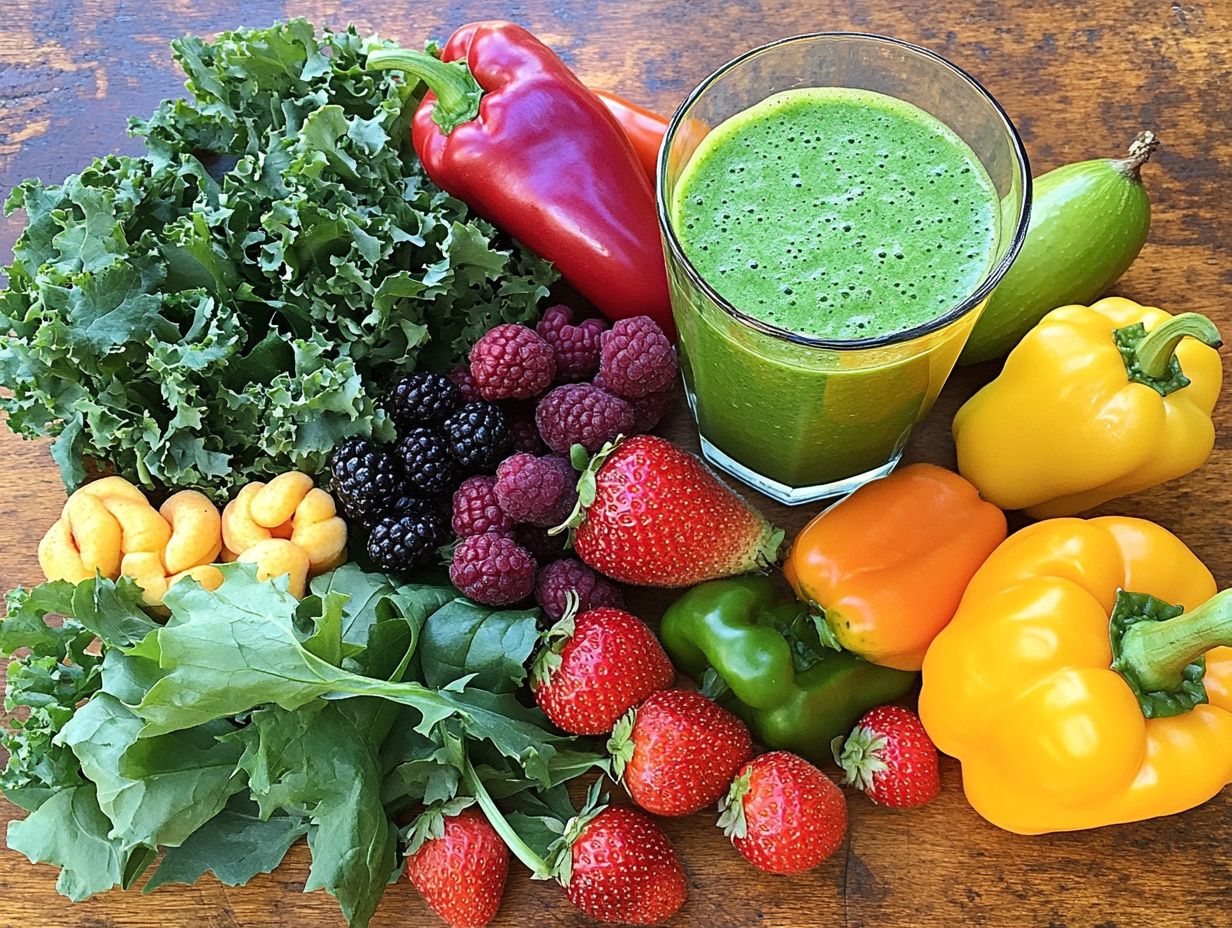 A vegan diet excludes animal products such as meat, dairy, and eggs due to their associated higher risks of metabolic and other diseases, like Alzheimers and dementia, as well as ethical considerations. The absence of these foods contributes to the positive metabolic health and lower disease risk commonly associated with plant-based diets. Individuals who follow a vegan diet often experience lower cholesterol levels, improved blood pressure, and enhanced overall well-being. Ethical considerations emphasize the importance of showing compassion toward nonhuman animals and avoiding industries that profit from their suffering and exploitation. Additionally, adopting a plant-based diet significantly reduces the carbon footprint linked to animal agriculture, resulting in a positive impact on the environment and contributing to clear skin through reduced hormonal impacts from animal products. This shift not only promotes a healthier lifestyle but also advocates for the humane treatment of animals. The health benefits of a vegan diet and the ethical treatment of nonhuman animals are closely interconnected, enhancing both physical activity and lifestyle medicine adherence.
A vegan diet excludes animal products such as meat, dairy, and eggs due to their associated higher risks of metabolic and other diseases, like Alzheimers and dementia, as well as ethical considerations. The absence of these foods contributes to the positive metabolic health and lower disease risk commonly associated with plant-based diets. Individuals who follow a vegan diet often experience lower cholesterol levels, improved blood pressure, and enhanced overall well-being. Ethical considerations emphasize the importance of showing compassion toward nonhuman animals and avoiding industries that profit from their suffering and exploitation. Additionally, adopting a plant-based diet significantly reduces the carbon footprint linked to animal agriculture, resulting in a positive impact on the environment and contributing to clear skin through reduced hormonal impacts from animal products. This shift not only promotes a healthier lifestyle but also advocates for the humane treatment of animals. The health benefits of a vegan diet and the ethical treatment of nonhuman animals are closely interconnected, enhancing both physical activity and lifestyle medicine adherence.
2. Processed Foods
Processed foods should be limited or avoided on a vegan diet, as they often contain unhealthy ingredients, added sugars, and high sodium levels that undermine the health benefits of plant-based eating, contributing to conditions like insulin resistance and elevated cholesterol levels. These unhealthy foods typically lack essential nutrients such as fiber, vitamins, and minerals, which are crucial for maintaining optimal health. Overconsumption of highly processed foods increases the risk of obesity and various chronic diseases, while also displacing more nutrient-dense options from the diet, reducing overall nutrient density. To promote a genuinely healthy vegan diet, individuals should focus on whole and minimally processed foods, such as:
- Fruits
- Vegetables
- Whole grains
- Legumes
- Nuts
By choosing these healthier options, individuals can maintain good health while adhering to their ethical and dietary beliefs, promoting dietary guidelines and reducing health risks.
3. Added Sugars and Fats
Added sugars and unhealthy fats can be detrimental to a vegan diet, potentially leading to various health issues such as weight gain, insulin resistance, and elevated cholesterol levels. These ingredients are often present in processed foods that may otherwise appear healthy, thereby contradicting the principles of a plant-based lifestyle and contributing to health risks such as diabetes. Many individuals who adopt veganism aim to improve their overall health by consuming whole, nutrient-dense foods. However, the allure of sugary snacks and processed vegan products can hinder these intentions. Excessive consumption of added sugars can result in inflammation and premature aging, while unhealthy fats such as trans fats found in certain snacks can contribute to heart disease and diminished heart health. Therefore, it is crucial for those following a vegan diet to be mindful of their food choices, as these hidden dangers can obstruct their pursuit of better health and achieving health improvements.
How to Ensure Proper Nutrient Intake on a Vegan Diet?
Maintaining proper nutrient intake on a vegan diet necessitates careful meal planning and, when necessary, the inclusion of a variety of foods that supply essential vitamins and minerals, ensuring compliance with dietary guidelines and supporting heart health. This approach not only helps individuals on a vegan diet meet their dietary requirements but also promotes healthy habits that contribute to overall well-being.
1. Plan Meals Carefully
Careful meal planning is essential for maintaining a balanced vegan diet, ensuring that individuals receive the proper nutrition needed to support their health and well-being while adhering to dietary guidelines and avoiding unhealthy foods. By planning meals in advance, one can guarantee the inclusion of a variety of fruits, vegetables, whole grains, and plant-based proteins, thus preventing nutrient deficiencies that can sometimes accompany a vegan lifestyle and ensuring a nutrient-rich diet. It is important to incorporate foods rich in essential nutrients such as Vitamin B12, iron, calcium, and omega-3 fatty acids, which are often lacking in a vegan diet due to its exclusion of animal products and emphasis on whole food consumption. Batch cooking and utilizing seasonal produce can save time while enhancing both flavor and nutrition. Using a meal-planning app or simply a calendar can be helpful for tracking available ingredients and planned meals, making it easier to create balanced plates that are both flavorful and nutritious.
2. Incorporate a Variety of Foods
Increased diversity in a vegan diet is essential because various foods offer distinct health benefits and unique nutritional profiles that contribute to overall health.
3. Consider Supplementation
Supplementation may be necessary for individuals on a vegan diet to ensure they obtain adequate amounts of key nutrients that are difficult to acquire from plant foods alone, such as vitamin B12, iron, and omega-3 fatty acids. These nutrients are essential as they play vital roles in various bodily functions, including energy production, immune function, and brain health. Consuming a variety of whole foods, such as vegetables, fruits, legumes, and whole grains, can offer health benefits like improved heart health, reduced cholesterol levels, better blood pressure regulation, and effective weight management. However, without proper precautions, individuals following a plant-based lifestyle may risk deficiencies that could lead to health complications, such as insulin resistance and nutrient shortfalls. To mitigate this risk, it is advisable for individuals to evaluate their dietary practices and consider consulting a medically trained healthcare professional or a registered dietitian. This approach can help identify specific nutritional shortfalls, such as low fiber intake or deficiencies in nutrient-rich diets, and assist in selecting appropriate, high-quality supplements from trusted sources. Moreover, incorporating fresh produce and reducing processed foods and added sugars can lead to significant health improvements. Ensuring that those on a vegan diet can achieve optimal health while adhering to their dietary choices is crucial for preventing chronic diseases and promoting overall well-being.


